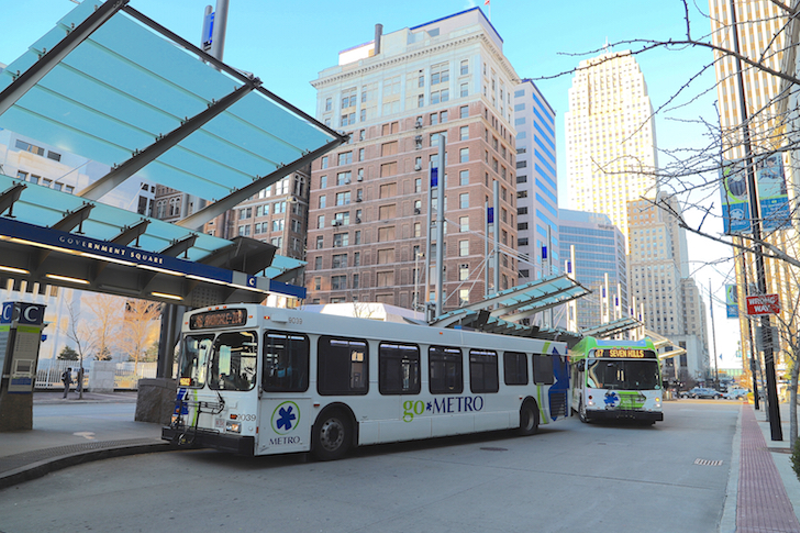The City of Cincinnati could end an earnings tax that funds the Southwest Ohio Regional Transit Authority’s Metro bus service if Hamilton County voters approve a county-wide sales tax to replace it.
But like most issues around boosting the region’s under-funded bus service, the proposed city charter amendment faces some complicated politics and competing proposals.
Cincinnati City Council member P.G. Sittenfeld yesterday proposed ending the unusual .3 percent earnings tax that goes to Metro if SORTA puts a county sales tax levy on the ballot in 2020.
If council approves the proposal with six votes by March 6, the charter amendment would go before voters in May 2019. Sittenfeld argues that the step is necessary to demonstrate to voters and tax levy skeptics that the city is serious about reorienting the way Metro is funded. That means a county-wide tax, Sittenfeld argues, but also making sure that residents aren’t “double taxed” for buses.
Last year, SORTA’s board voted against putting that levy on the ballot, though it could present voters with as much as a 1 percent boost to the county sales tax next year.
Sittenfeld says that making the gesture will increase the likelihood of the tax levy passing. But critics say that the city needs the money from the earnings tax.
“If the voters say, ‘thanks, but no thanks,’ we haven’t done one bit of good for the buses, for our budget, for anything else,” Sittenfeld said at an Education, Innovation and Growth council committee.
“We need to dramatically improve — and inject more resources into — our ability to connect people to jobs in our region. Not to mention to medical appointments, to grocery stores and recreation,” he said. “There is a massive sense of urgency.”
But critics say the city shouldn’t be so quick to cut its earnings tax at a time when the city is facing a $19 million budget deficit.
Council member Chris Seelbach acknowledged that the county tax is needed, but said Cincinnati has the lowest income tax rate in the state. He pointed out that cities like Dayton have a higher rate at 2.5 percent and don’t use it to pay for bus service.
“It’s irresponsible for me to say that I would be willing to decrease the earnings tax by .3 percent if the sales tax passed,” he said. “The elephant in the room is that we have a revenue problem.”
The .3 percent is tied to transit funding under the city's charter, however, and Sittenfeld pointed out that using it for other things would require another charter amendment.
Council member Greg Landsman says that he supports a one-cent county sales tax levy, but acknowledged that passing it would be a heavy lift. Landsman says both the city's low earnings tax and transit funding system need to be addressed, however.
"While Cleveland and Columbus and Dayton are at 2.5 and can do the things we can't do, we're at 1.8," he said, speaking of earnings tax percentages that go to city services. "Both have to change, ultimately."
Since the 1970s, Metro has relied heavily on its portion of the city’s 2.1 percent payroll tax. The system, which stretches throughout Hamilton County and beyond, gets no direct contribution from county taxpayers, though county residents working in the city pay earnings taxes and the bus system does get a small amount of money from the state of Ohio as well.
“SORTA is the only transit authority in the state of Ohio and one of the only in the country that is funded by a city earnings tax,” said Pete Metz, Transportation Policy and Coalition Manager for the Cincinnati USA Regional Chamber. “Most are funded by county-wide sales taxes. That funding is outdated and insufficient to serve the needs of bus riders, our member businesses and to connect people to everything they need to get to in our region. I think it’s safe to say there is broad consensus that we have to move away from that funding model and move toward something that is more sustainable.”
Sittenfeld points out that roughly 40 percent of county sales tax revenues come from outside Hamilton County.
“The obvious thing is the sales tax,” he says. “This is about as close as you can get to a funding mechanism that actually is a regional funding mechanism.”
Meanwhile, another proposal on the table from transit activist Better Bus Coalition would actually raise the city’s earnings tax going to Metro to .5 percent unless county voters approve a tax levy for buses. In that event, the proposal, which Better Bus Coalition is promoting as a ballot initiative, would cut Metro’s take from the city earnings tax to .1 percent.
“We told Cincinnatians that they would see a SORTA tax one way or another," Better Bus Coalition President Cam Hardy wrote in a series of tweets. "It's great to see real movement from city hall and the SORTA board on this. I want to see more unity on the SORTA board. I'd like to also see a true debate about the earnings tax rollback. How do we ensure that the city keeps leverage and influence within metro? Full handing it to the county isn't necessarily the best idea in my opinion. I hope to talk to council members in the coming days.”


